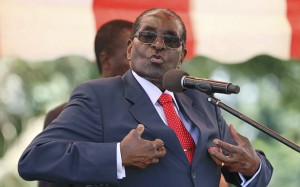In 2000, this lowly newspaperman secured a ringside seat to watch the unravelling of Zimbabwe.
The invasions of white-owned farms by mobs led by war veterans was in full force. President Robert Mugabe had just lost the constitutional referendum and was livid. The opposition had campaigned hard against him and the people had listened to them, not him.
Once revered by the people but now scorned by them, the old man was fearful of what this meant for the upcoming parliamentary election.
He needed a love potion to “woo back lost lover”, as the traffic-light pamphlets say.
His love potion was the land question and the continued domination of this crucial economic sector by a minority.
Twenty years after independence, white farmers controlled most agricultural land. With agriculture – in particular, tobacco – being a major component of the gross domestic product and a huge foreign exchange earner, white Zimbabweans were in the pound seats economically. They enjoyed extreme wealth compared to their black compatriots. This was a source of much resentment.
Mugabe knew what pressing the land button meant. Land was at the centre of the two Chimurengas – the 1890s uprising against the colonial occupiers and the 20th-century liberation war. Because so much blood was spilt getting the land back, the issue was, and is, close to the hearts of Zimbabweans.
So, the self-serving Mugabe started spewing anti-colonial, anti-West and anti-white rhetoric. This spurred the invasion of white farms, often with the support of the security forces. The Zanu-PF government slyly attributed the invasions to the impatience of the people.
The result of this was the destruction of Zimbabwe’s agricultural sector, which had a knock-on effect on all other sectors of the economy.
Industry collapsed, unemployment rocketed, infrastructure fell apart, inflation soared, the Zimbabwean dollar became worth less than single-ply toilet paper and supermarkets could not even stock the most basic products. Zimbabweans fled south, west, east, north and beyond the seas.
Within eight years, the country was on the brink of becoming a failed state as policy and governance became whatever Mugabe and Zanu-PF’s hardliners woke up thinking on a particular day. The five-year Government of National Unity, brokered in 2008, brought some respite and arrested the decline.
But Zimbabwe is still suffering from the wild, populist and self-serving decisions of 2000.
Land is a word that has been very much on the lips of South Africa’s first citizen of late. The more he has become embattled, the more he has aped Mugabe’s land rhetoric. He has belatedly discovered the land question and made it a pillar of his legacy. He has upped his anti-colonialism and anti-Western pitch.
Cognisant of the racially defined gross inequality, he makes a point of stoking the already high levels of anger among the black poor.
The rhetoric grew louder and crazier as he faced a revolt from within his own party. The frequency increased after last year’s damning Constitutional Court judgment on the Nkandla saga and the August 2016 municipal election results.
When ANC veterans and stalwarts challenged his leadership, he characterised them as pawns of the powers who were afraid of his radical stance.
Some of the rhetoric is the stuff of fantasy. Who in their right minds would vocalise a private thought about pushing the restitution deadline a few centuries back, when South Africa is battling with the 1913 cut-off date? On Friday, he added this idea to his file of lunacies. Addressing the National House of Traditional Leaders, he called for “a precolonial audit of land ownership, use and occupation patterns”. He said once such an audit was done, a single land law would be “developed to address the issue of land restitution without compensation”.
Constitutional amendments would then be made to ensure this happened, and the National Land Claims Commission would be made a chapter 9 institution, with powers similar to those of the Public Protector. Interestingly, he made this statement just days after his own party members had argued and voted against such a move in Parliament.
In doing so, they were informed by the fact that the Constitution is not a hindrance to land restitution and land reform.
The process has been bedevilled by poor implementation on the part of the state. It has also been hobbled by the fact that black South Africans are not as romantic and sentimental about land as Zimbabweans and some of our other neighbours.
Mentally, they have long moved on, and those with sentimental attachments have them because there is a recent history of rural to urban migration in the family.
Hunger for land is in the urban areas, where people are living on top of each other in informal settlements. And that is a totally different headache, which requires the kind of energy that is being spent obsessing about impractical fantasies.
So, inasmuch as there may be this populist agitation around land from high up, this is a fire unlikely to catch. What will catch is the racially charged nature of the agitation. It is this part that will resonate with the urban poor. Whether the president and those around him who are stoking this racial anger will be able to channel it is doubtful.
This is the danger of populism. It provides simple answers to complex problems and avoids proper thinking and planning. The aftermath is almost always ruination. Just ask our neighbours.
Post published in: Featured


